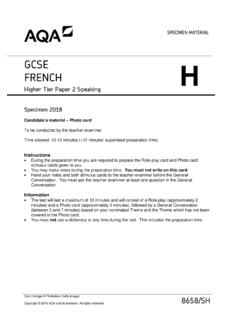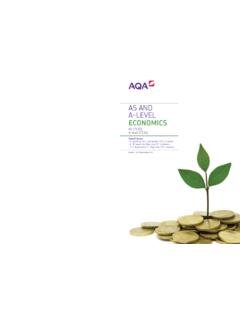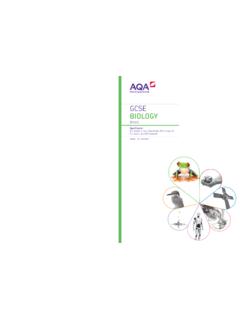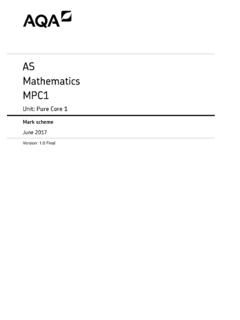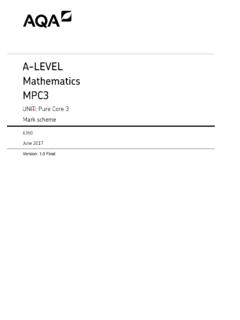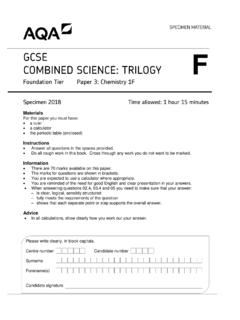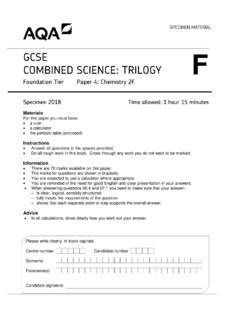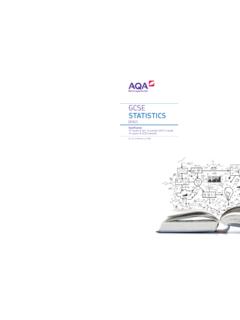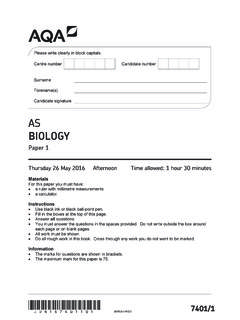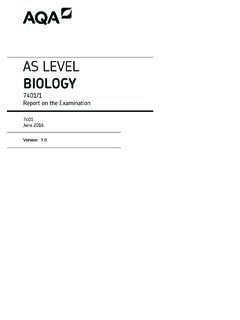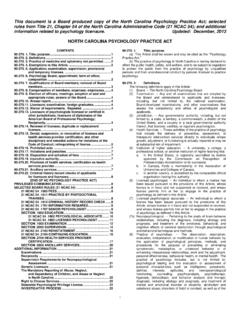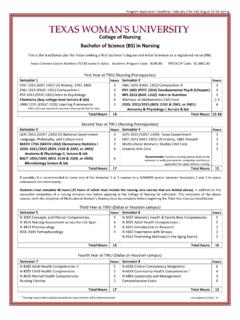Transcription of Get help and support GCSE PSYCHOLOGY
1 Copyright 2016 AQA and its licensors. All rights retains the copyright on all its publications, including the specifications. However, schools and colleges registered with AQA are permitted to copy material from this specification for their own internal Education (AQA) is a registered charity (number 1073334) and a company limited by guarantee registered in England and Wales (company number 3644723). Our registered address is AQA, Devas Street, Manchester M15 help and supportVisit our website for information, guidance, support and resources at can talk directly to the PSYCHOLOGY subject teamE: 01483 477 822 GCSEPSYCHOLOGY(8182)SpecificationFor teaching from September 2017 onwardsFor exams in 2019 onwardsVersion 22 December 20163 gcse PSYCHOLOGY (8182). For exams 2019 onwards. Version for the most up-to-date specification, resources, support and administrationContents1 Introduction Why choose AQA for gcse PSYCHOLOGY support and resources to help you teach 52 Specification at a glance Subject content Assessments 93 Subject content Cognition and behaviour Social context and behaviour 144 Scheme of assessment Aims and learning outcomes Assessment objectives Assessment weightings 205 General administration Entries and codes Overlaps with other qualifications Awarding grades and reporting results Re-sits and shelf life Previous learning and prerequisites Access to assessment: diversity and inclusion Working with AQA for the first time Private candidates Use of calculators 236 Appendix.
2 Mathematical requirements Arithmetic and numerical computation Handling data 244 Visit for the most up-to-date specification, resources, support and administrationAre you using the latest version of this specification? You will always find the most up-to-date version of this specification on our website at We will write to you if there are significant changes to this PSYCHOLOGY (8182). For exams 2019 onwards. Version for the most up-to-date specification, resources, support and administration1 Why choose AQA for gcse PsychologyThis engaging and effective qualification introduces students to the fundamentals of PSYCHOLOGY , developing critical analysis, independent thinking and research on the success of our previous specification we ve refreshed the topics and introduced the latest advances in the subject. We gained feedback from teachers to ensure it s as clear, engaging and easy-to-use as possible.
3 You ll see many familiar and popular topics from our previous specification, which means you can continue to use many of your existing resources. Our assessments use multiple choice, short answer and extended writing/essays to assess knowledge, understanding, application and evaluation of research methods gained through classroom experience of practical PSYCHOLOGY will be assessed using scenario-based can find out about all our PSYCHOLOGY qualifications at support and resources to help you teachWe ve worked with experienced teachers to provide you with a range of resources that will help you confidently plan, teach and prepare for Teaching resourcesVisit to see all our teaching resources. They include: flexible schemes of work to help you plan for course delivery in your own way specimen assessment materials that will give your students a clear idea of what is expected in the exams training courses to help you deliver AQA PSYCHOLOGY qualifications subject expertise courses for all teachers, from newly qualified teachers who are just getting started to experienced teachers looking for fresh for examsVisit for everything you need to prepare for our exams, including: past papers, mark schemes and examiners reports specimen papers and mark schemes for new courses Exampro.
4 A searchable bank of past AQA exam questions example student answers with examiner for the most up-to-date specification, resources, support and administrationAnalyse your students' results with Enhanced Results Analysis (ERA)Find out which questions were the most challenging, how the results compare to previous years and where your students need to improve. ERA, our free online results analysis tool, will help you see where to focus your teaching. Register at information about results, including maintaining standards over time, grade boundaries and our post-results services, visit your skills up-to-date with professional developmentWherever you are in your career, there s always something new to learn. As well as subject specific training, we offer a range of courses to help boost your skills. Improve your teaching skills in areas including differentiation, teaching literacy and meeting Ofsted requirements.
5 Prepare for a new role with our leadership and management can attend a course at venues around the country, in your school or online whatever suits your needs and availability. Find out more at PSYCHOLOGY (8182). For exams 2019 onwards. Version for the most up-to-date specification, resources, support and administrationGet help and supportVisit our website for information, guidance, support and resources at you d like us to share news and information about this qualification, sign up for emails and updates at , you can call or email our subject team : 01483 477 8228 Visit for the most up-to-date specification, resources, support and administration2 Specification at a glanceThis qualification is linear. Linear means that students will sit all their exams at the end of the Subject contentCognition and behaviour (page 10)1 Memory (page 10)2 Perception (page 11)3 Development (page 12)4 Research methods (page 12)Social context and behaviour (page 14)1 Social influence (page 15)2 Language, thought and communication (page 15)3 Brain and neuropsychology (page 16)4 Psychological problems (page 17)9 gcse PSYCHOLOGY (8182).
6 For exams 2019 onwards. Version for the most up-to-date specification, resources, support and Assessments+Paper 1: Cognition and behaviourWhat's assessed Memory Perception Development Research methodsStudents will be expected to draw on knowledge and understanding of the entire course of study to show a deeper understanding of these it's assessed Written exam: 1 hour 45 minutes 100 marks 50% of GCSEQ uestions Section A: multiple choice, short answer and extended writing (25 marks) Section B: multiple choice, short answer and extended writing (25 marks) Section C: multiple choice, short answer and extended writing (25 marks) Section D: multiple choice, short answer and extended writing (25 marks)Paper 2: Social context and behaviourWhat's assessed Social influence Language, thought and communication Brain and neuropsychology Psychological problemsStudents will be expected to draw on knowledge and understanding of the entire course of study to show a deeper understanding of these it's assessed Written exam: 1 hour 45 minutes 100 marks 50% of GCSEQ uestions Section A: multiple choice, short answer and extended writing (25 marks) Section B: multiple choice, short answer and extended writing (25 marks) Section C: multiple choice, short answer and extended writing (25 marks) Section D: multiple choice, short answer and extended writing (25 marks)10 Visit for the most up-to-date specification, resources, support and administration3 Subject Cognition and behaviourStudents will be expected to.
7 Demonstrate knowledge and understanding of psychological ideas, processes, procedures and theories in relation to the specified Paper 1 content apply psychological knowledge and understanding of the specified Paper 1 content in a range of contexts analyse and evaluate psychological ideas, information, processes and procedures in relation to the specified Paper 1 content and make judgements, draw conclusions and produce developments or refinements of psychological procedures based on their reasoning and synthesis of skills evaluate therapies and treatments including in terms of their appropriateness and effectiveness show how psychological knowledge and ideas change over time and how these inform our understanding of behaviour demonstrate the contribution of PSYCHOLOGY to an understanding of individual, social and cultural diversity develop an understanding of the interrelationships between the core areas of PSYCHOLOGY show how the studies for topics relate to the associated and understanding of research methods (see Research methods), practical research skills and mathematical skills (see Appendix A: mathematical requirements) will be assessed across all topic areas in Paper 1.
8 These skills should be developed by studying the specification content and through ethical, practical research activities, involving: designing research conducting research analysing and interpreting carrying out practical research activities, students will manage associated risks and use information and communication technology (ICT). MemoryContentAdditional informationProcesses of memory: encoding (input) storage and retrieval (output)Different types of memory: episodic memory, semantic memory and procedural memories are encoded and of memoryThe multi-store model of memory: sensory, short term and long of each store: coding, capacity, and recency effects in recall: the effects of serial s serial position curve PSYCHOLOGY (8182). For exams 2019 onwards. Version for the most up-to-date specification, resources, support and administrationContentAdditional informationMemory as an active processThe Theory of Reconstructive Memory, including the concept of effort after meaning.
9 Bartlett s War of the Ghosts affecting the accuracy of memory, including interference, context and false PerceptionContentAdditional informationSensation and perceptionThe difference between sensation and cues and constanciesMonocular depth cues: height in plane, relative size, occlusion and linear depth cues: retinal disparity, 's direct theory of perception the influence of natureThe real world presents sufficient information for direct perception without inference. Role of motion parallax in everyday illusionsExplanations for visual illusions: ambiguity, misinterpreted depth cues, fiction, size of visual illusions: the Ponzo, the M ller-Lyer, Rubin s vase, the Ames Room, the Kanizsa triangle and the Necker 's constructivist theory of perception the influence of nurturePerception uses inferences from visual cues and past experience to construct a model of affecting perceptionPerceptual set and the effects of the following factors affecting perception.
10 Culture, motivation, emotion, Gilchrist and Nesberg study of motivation and the Bruner and Minturn study of perceptual for the most up-to-date specification, resources, support and DevelopmentContentAdditional informationEarly brain developmentA basic knowledge of brain development, from simple neural structures in the womb, of brain stem, thalamus, cerebellum and cortex, reflecting the development of autonomic functions, sensory processing, movement and roles of nature and s stage theory and the development of intelligenceThe role of Piaget s theory in educationPiaget s Theory of Cognitive Development including concepts of assimilation and four stages of development: sensorimotor, pre-operational, concrete operational and formal operational. Application of these stages in of egocentricity, development of conservation. McGarrigle and Donaldson s naughty teddy study ; Hughes policeman doll study.
